Latest News
Research & Innovation
Massey researchers and community members work to “close the gap” with Lung Cancer Summit
Nov 9, 2022
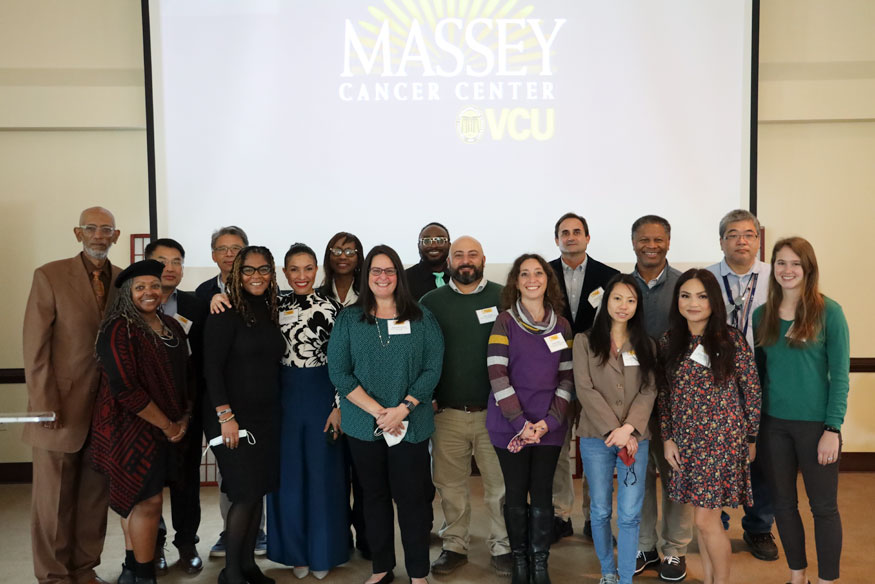
Researchers and community members came together to share and learn from each other at last week’s inaugural Lung Cancer – Closing the Gap Summit held at 5th Street Baptist Church. The event, which focused on the importance of community engagement in addressing health disparities in lung cancer screening and treatment, featured scientific presentations from VCU Massey Cancer Center researchers and clinicians, group discussions and a community panel.
Lung cancer is the third most common cancer in the United States, and the leading cause of cancer death for both men and women. Each year, lung cancer claims more lives than colorectal, breast, prostate and pancreatic cancer combined. While all races and ethnicities are impacted by lung cancer, Black men have both a higher incidence and higher mortality rate than other groups.
In his welcoming remarks, Santiago Lima, Ph.D., a Massey member, assistant professor of biology at VCU and chair of the lung summit planning committee, thanked the community members in the audience for their participation and summed up the day’s goal: “We want to hear from the community about what we can better do to serve you.”
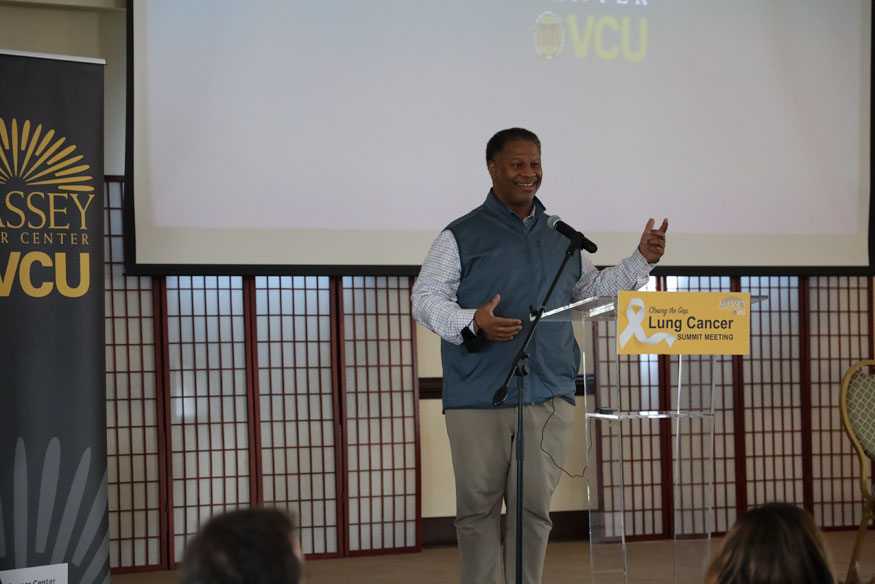 Massey Cancer Center Director Robert A. Winn, M.D. welcomes attendees to the inaugural Lung Cancer Summit.
Massey Cancer Center Director Robert A. Winn, M.D. welcomes attendees to the inaugural Lung Cancer Summit.
“This event is part of an effort to bridge a gap that’s been missing for a very long time. Lung cancer is still the number one cancer killer, but I want our community to take away from today’s event that we are seeing progress,” said Robert A. Winn, M.D., director and Lipman chair in oncology at Massey. “Early in my career, we didn’t even bother to screen for lung cancer, and being successfully treated with a drug had about the same chance as winning the lottery.”
By contrast, he added, “Now, we can screen you, and if you’re eligible that screening is free. Even with advanced cancer, we have hope, and immunotherapies we didn’t have before. The future is here. It’s just unevenly distributed. We have to change that game and close those gaps.”
Raising awareness for screening
Progress was a theme touched on by many presenters, including Patrick Nana-Sinkam, M.D., chair and professor in the Division of Pulmonary Disease and Critical Care Medicine at VCU School of Medicine, the Linda Grandis Blatt Endowed Chair in Cancer Research and co-director of the Lung Cancer Screening Program at Massey. Nana-Sinkam noted the complexity of lung cancer disparities in screening and survival rates, and the importance of community partnerships to narrow those gaps.
“I’ve watched this field grow for 20 years. Ten years ago, the majority of people who got diagnosed would come to their physician with late-stage disease after presenting with symptoms. Now, with early detection, we can reduce mortality and we need to focus our community efforts on more vulnerable groups like Black and African American males.”
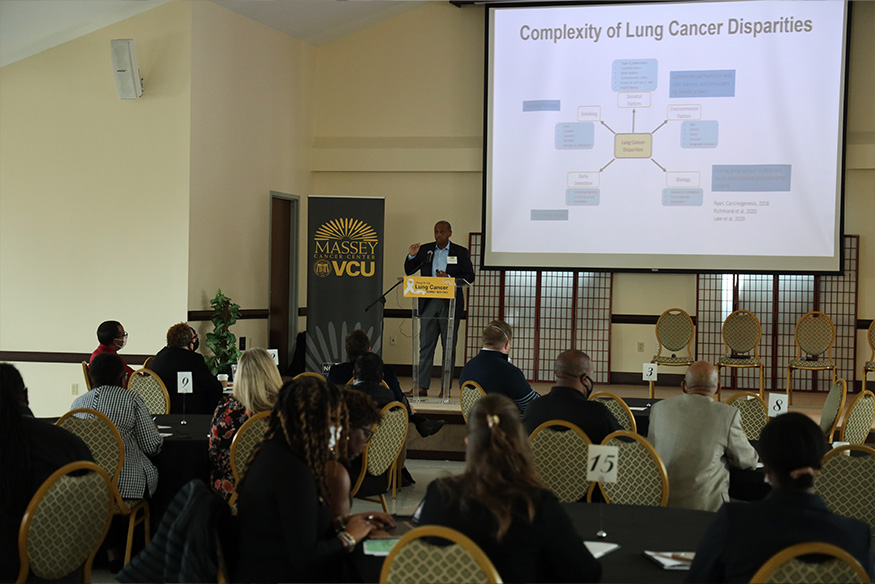 Patrick Nana-Sinkam, M.D., speaking about the importance of increased lung cancer screening.
Patrick Nana-Sinkam, M.D., speaking about the importance of increased lung cancer screening.
In 2021, the U.S. Preventive Services Task Force updated the eligibility criteria for annual low-dose CT lung scans, substantially increasing the number of those qualified for this potentially life-saving screening. Despite the availability of this free scan, Nana-Sinkam said that only about 5% of eligible Virginians get screened. He urged those in the audience to be advocates for screening and reducing stigma around lung cancer. “Two minutes [for a CT scan] can save a life. Lung cancer screening reduces mortality by 20% — that’s comparable to mammography.”
A focus on clinical trials
A morning mixer sparked conversation among participants, as attendees were asked questions including what factors contribute to lung cancer incidence in Virginia, approaches to prevent lung cancer deaths in the area and how we can raise awareness and increase participation in clinical trials.
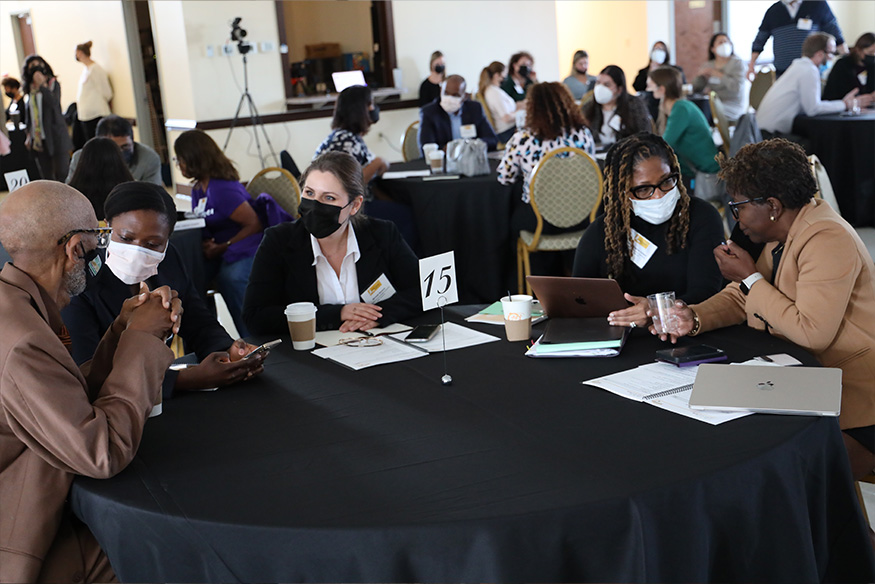 Community members and researchers discuss questions in the event’s morning mixer.
Community members and researchers discuss questions in the event’s morning mixer.
The focus on clinical trials continued with a “Clinical Trials 101” presentation from Eziafa Oduah, M.D., Ph.D., hematology-oncology fellow at Massey Cancer Center, and a panel discussion on lowering barriers to clinical trials. The panel, moderated by Erin Alesi, M.D., medical oncologist and member of the Developmental Therapeutics research program at Massey and a co-chair of the lung summit planning committee, discussed how researchers find and open clinical trials, and what barriers the group had encountered to clinical trial research.
“When I was in fellowship, we had a low response rate – around 2% – from clinical trials for new therapies,” said Renato Martins, M.D., M.P.H., chair of hematology, oncology and palliative care at Massey, discussing improvements in treatment due to clinical tries he’s seen over the course of his career. “Now we can molecularly engineer drugs to do exactly what we want them to do and inhibit exactly what we want to inhibit, which has led to a number of drugs in lung cancer with results so spectacular that they were approved by the FDA based on the result of the first human trials.”
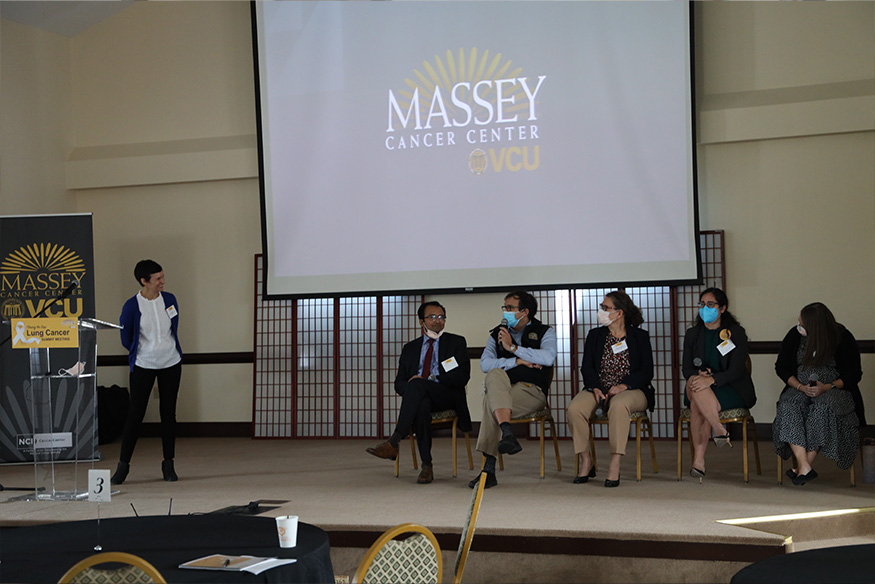 Panelists share their perspective on the state of clinical trials.
Panelists share their perspective on the state of clinical trials.
Michelle Liendo, MSHI, CCRP, PMP, director of clinical research operations at Massey, emphasized the importance of paying attention to the specific needs and experiences of the local population to find studies that represent and reflect those needs. The panelists identified access as significant barrier – including issues with transportation, time off work or need for accommodations – and the importance of education and help navigating through the trial process.
“Many patients hear trial and think placebo, and that there’s a chance they won’t get treatment at all,” said Elizabeth Roadcap, R.N., thoracic nurse navigator at Massey. “We have to educate them from that first appointment, correct any misunderstandings and give them time to think about it and give their consent.”
Sharing the latest research
Other Massey members gave scientific presentations about their research on the below topics, and additional poster presentations were displayed throughout the day.
- Sandro R.P. da Rocha, Ph.D., professor at VCU School of Pharmacy and member of the Developmental Therapeutics research program at Massey, presented “Inhaled Immunotherapy Safely Enhances the Effect of Standard of Care.”
- Caroline Cobb, Ph.D., associate professor of health psychology at VCU School of Medicine and member of the Cancer Prevention and Control research program at Massey, presented “Predicting the Effect of a Menthol Cigarette and Flavored Cigar Ban Among African American/Black Cigarette Smokers.”
- Lulin Yuan, Ph.D., Massey radiation oncologist and assistant professor at VCU School of Medicine, presented “Improving Patient Outcomes with Lung Cancer Radiation Therapy through Artificial Intelligence-Aided Treatment Planning.”
- Sherrick Hill, B.A., clinical research assistant in the VCU Office of Health Equity and Disparities Research, presented “Understanding Health Disparities of African American Men in Lung Cancer Screenings.”
Community champions
The day’s presentations ended with a panel discussion on bridging the translational research divide with members of community health organizations. Representatives from Capital Area Health Network, Capital Area Health Education Center and Pathways shared their perspective on topics including encouraging community members to participate in preventive care and screenings and how Massey researchers can better partner with their organizations and the community.
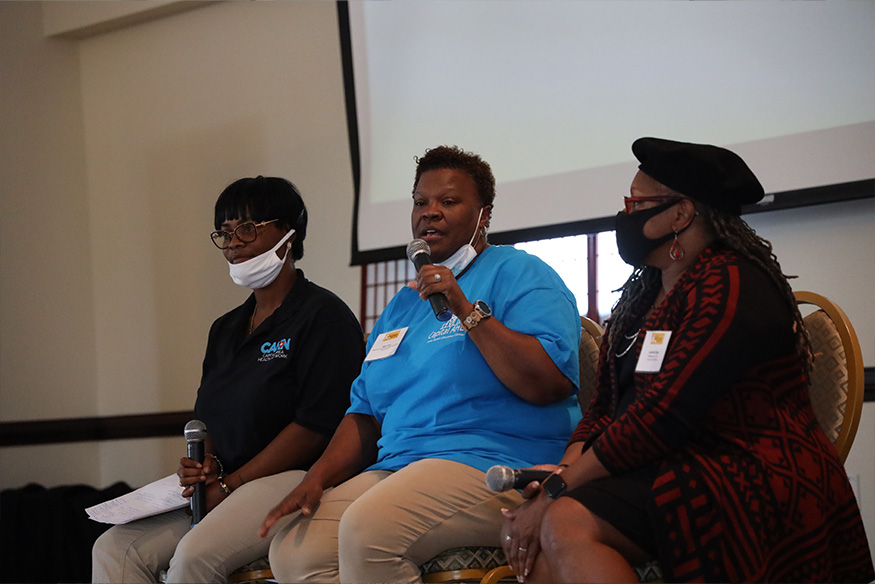 Community health partners shared their perspective on working with Massey researchers.
Community health partners shared their perspective on working with Massey researchers.
“We have to understand what you’re trying to research and make sure it’s something that’s a value to the community, not just a one-way street,” said Juanita Epps of Pathways. “That’s my family, so we need to know how you’re going to invest in the interest of the community and help them become well.”
Among the community members in attendance was Ron Thompson, a member of the lung summit planning committee. “What I’ve learned here, I can take back to the community and as a layman, explain it to them,” he said. “And not as a doctor. I can talk to people on the streets and spread this knowledge. That’s what I’m all about, trying to improve and educate the people [in my district].”
In his remarks, Winn addressed the need for two-way communication between researchers and community members. “I’m asking you to help us be better by helping us refine the questions we seek to answer in our research, because some of the questions you have are probably ones that we’re not asking but we ought to be,” he said. “We at Massey are going to come in with the humility and the mission we know we are driven by—bringing the science closer to the community and the community closer to the science so we can all be better.”
Written by: Annie Harris
Related News
Research & Innovation
Robert A. Winn Excellence in Clinical Trials Program Annual Convening highlights long-term, dynamic public-private partnershipNov 24, 2025
Research & Innovation
Commonwealth of Virginia Cancer Research Conference unites cancer researchers, students, and trainees from across the stateNov 21, 2025
Research & Innovation
Targeted drug could benefit pediatric and young adult patients with invasive soft tissue cancerNov 18, 2025

Get access to new, innovative care
Treatments in clinical trials may be more effective or have fewer side effects than the treatments that are currently available. With more than 200 studies for multiple types of cancers and cancer prevention, Massey supports a wide array of clinical trials.

Find a provider
Massey supports hundreds of top cancer specialists serving the needs of our patients. Massey’s medical team provides a wealth of expertise in cancer diagnosis, treatment, prevention and symptom management.
